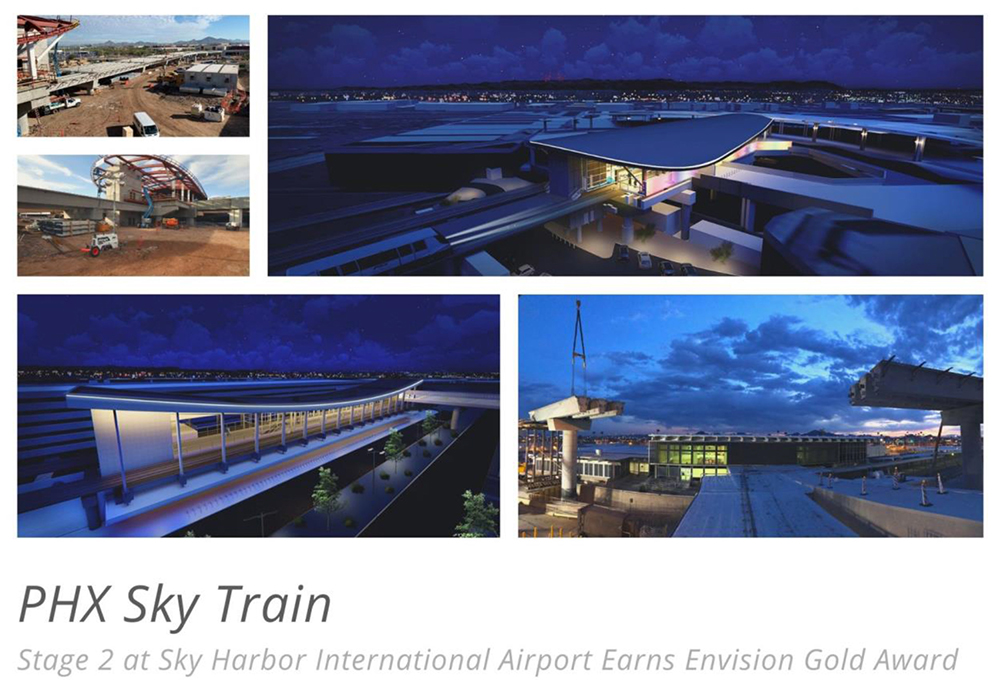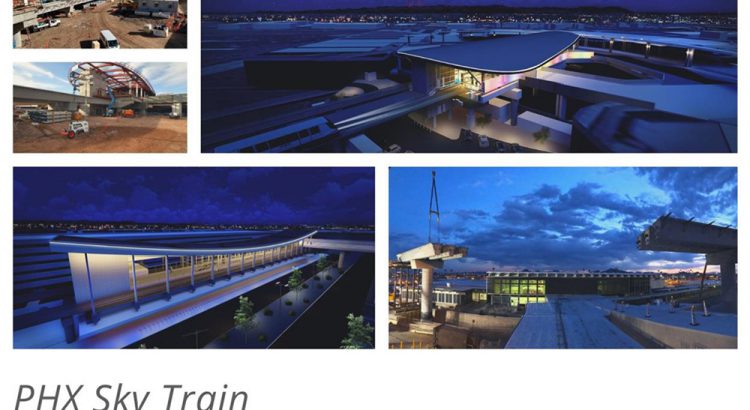The Institute for Sustainable Infrastructure (ISI) announced today that Stage 2 of Phoenix’s Sky Harbor International Airport Sky Train (PHX Sky Train®) is the recent recipient of an Envision Gold Award for sustainability. This is the airport’s first Envision award and the third Envision-awarded project in the State of Arizona.
Stage 2 of the PHX Sky Train® is underway at the Sky Harbor International Airport. This is an extension to the existing 3.2-mile PHX Sky Train, which currently operates between the 44th Street PHX Sky Train station and Terminal 3. When Stage 2 is complete and fully operational in 2022, it will extend another 2.5 miles to the airport’s rental car center.
The project includes:
- aircraft bridges that will carry two future taxiways over the train system;
- an elevated station which will accommodate parking, ground transportation, and future development;
- an elevated rental car center station built directly into the existing rental car center at the airport;
- three traction power substations to provide power to 24 additional transit vehicles.
The project aims to enhance customer service and improve accessibility, ease traffic congestion on Sky Harbor Boulevard, and make travel easier and more efficient between terminals. The project will serve as a catalyst for longterm airport growth and adjacent private development. It also helps support the airport’s sustainability goals as it will help reduce the daily vehicle count by an estimated 20,000 vehicles per day. The project is funded from rental car facility charges and airline passenger facility charges; no taxpayer dollars are being used to fund this state-ofthe-art, sustainable project.

The City of Phoenix Aviation Department worked in close collaboration with several project partners to deliver this award-winning sustainable project, including Gannett Fleming, Inc. (Engineer of Record); Smith Group (Architect); Hensel Phelps (Contractor); Kimley-Horn (Engineering Subconsultant); J2 (Landscape Architect) and Golden engineering and environmental design Engineering (Lead Envision Consultant). The Construction Management-At-Risk (CMAR) project delivery model was used to fast-track delivery, allowing for overlapping design and construction phases.
“ISI is pleased to present the Envision Gold Award to the City of Phoenix Aviation Department and their project partners for Phase 2 of the PHX Sky Train project,” said Melissa Peneycad, ISI’s managing director and director of sustainable projects. “The PHX Sky Train eliminates the need for shuttle busses and cars between airport terminals and passenger facilities, reduces road congestion, and encourages the use of more sustainable transportation options, making this automated people mover project an excellent example of sustainability. Hopefully, this project will encourage other major airports to consider ways to reduce their own environmental footprint.”
“The Sky Train program, from its early planning stages, has always strived to improve airport access and passenger experience with a transit system that is operationally highly efficient and sustainable. The success of the system in terms of ridership, reduced congestion, and highly favorable reviews from passengers and airport employees speaks to the system’s function and efficiency,” said Mark Pilwallis, PE, SE, SCBI, a Gannett Fleming vice president and project manager. “The Envision Gold Award is truly exciting for our team – it confirms that our approach to the design and delivery of the project meets a high standard for sustainability. It also clearly shows that the City of Phoenix’s basic criteria and approach to developing sustainable infrastructure is among the best in the country and can be used as a model for others to follow.”
The Envision sustainable infrastructure framework assesses project sustainability across five categories: Quality of Life, Leadership, Resource Allocation, Natural World, and Climate and Resilience. These key areas contribute to positive social, economic, and environmental impacts on a community during the planning, design, and construction of infrastructure projects. Some of the factors contributing to Stage 2 of PHX Sky Train earning an Envision Gold award include:
Increasing service reliability. The grade separated, completely automated, fully monitored people mover system is both safer and significantly more reliable for the traveling public than the series of shuttle busses intermixed with passenger vehicles, taxi limos, busses, and other roadway vehicles it aims to replace. Reliability reports from the existing PHX Sky Train® shows how Stage 2 will help eliminate long shuttle lines, making for a greatly improved experience for the traveling public.
Encouraging travelers to use more sustainable modes of transportation. The PHX Sky Train system is equipped with attractive, eye-catching and informational signage and route information, making the system intuitive, convenient and easy for the traveling public to use. Usage reports from the current PHX Sky Train, coupled with models for Stage 2, show this project will reduce the daily vehicle count by 20,000.
Improved energy efficiency. A number of energy reduction measures were incorporated into this project, resulting in operational energy reductions of 59%. Independent commissioning agents have been contracted for the project to ensure proper and efficient functioning of all energy systems.
Improved infrastructure integration. Throughout project planning and development, the project team worked closely with the City of Phoenix Aviation Department to integrate the extension of the PHX Sky Train with future plans within the airport’s footprint as well as integrate the project with community infrastructure. The PHX Sky Train links the airport’s terminals, major buildings and other facilities, including the car rental center. Before the Sky Train, airport employees and the traveling public had no choice but to rely on cars and a more complicated network of busses. Stage 2 of the PHX Sky Train will provide additional necessary links to airport facilities, as well as the Valley Metro Light Rail System.




